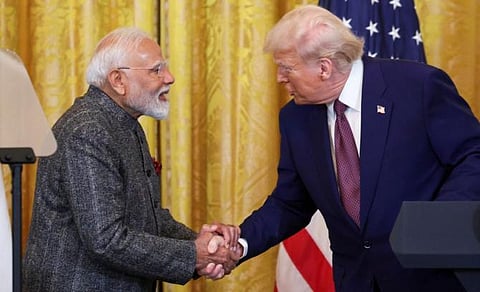

JAMMU/SRINAGAR: Fresh border skirmishes erupted just hours after India and Pakistan announced a US-brokered ceasefire, threatening to unravel the fragile peace agreement reached earlier today.
As per latest reports, heavy cross-firing has resumed along the Line of Control at R S Pura, Akhnoor and Rajouri areas with heavy mortar shelling by Pakistan. Multiple explosions were also heard in Srinagar.
Minister Satish Sharma of the Omar Abdullah-led Jammu and Kashmir government confirmed late Saturday that multiple border areas are experiencing renewed hostilities despite the ceasefire that was meant to take effect at 5:00 PM.
"Firing is being reported at the borders. Heavy firing is going on at several places. They (Pakistan) must honour the ceasefire. I'm present here on the ground and monitoring the situation closely," Minister Sharma told a local news agency, JKNS.
Local officials and residents in parts of Poonch, Rajouri, and Uri have confirmed hearing gunfire in the evening hours.
Additionally, security sources have reported Pakistani drones entering the Kashmir valley across several districts including Anantnag, Budgam, and Srinagar.
Ceasefire Agreement
The violations come just hours after US President Donald Trump announced on his Truth Social platform that India and Pakistan had agreed to a "full and immediate ceasefire" following US-mediated negotiations.
"After a long night of talks mediated by the United States, I am pleased to announce that India and Pakistan have agreed to a 'full and immediate ceasefire'. Congratulations to both Countries on using Common Sense and Great Intelligence," Trump wrote.
The agreement was subsequently confirmed by both nations, with Indian Foreign Secretary Vikram Misri announcing that the Director Generals of Military Operations from both countries had spoken at 3:35 PM and agreed to halt all military actions on land, air, and sea from 5:00 PM IST today.
Pakistan's Deputy Prime Minister and Foreign Minister Ishaq Dar similarly confirmed the agreement on social media, stating that "Pakistan has always strived for peace and security in the region, without compromising on its sovereignty and territorial integrity."
US Mediation Claims
The ceasefire announcement has sparked controversy over the exact role of US mediation. US Secretary of State Marco Rubio claimed significant American involvement, noting that "Vice President JD Vance and I have engaged with senior Indian and Pakistani officials, including Prime Ministers Narendra Modi and Shehbaz Sharif" among other high-ranking officials.
However, the Modi government has denied any American role in brokering the ceasefire, with Indian sources contradicting Rubio's statements about broader talks.
While the US officials were openly boasting that they have made the two countries agree to a ceasefire, Indian officials were hesitant in telling media that an agreement has been reached between the two countries.
Sources in India also contradicted the US Secretary of State Marco Rubio saying, "There is no decision to hold talks on any other issue at any other place."
Developments in Recent Days
The announcement comes after weeks of escalating tensions that began with a deadly terrorist attack in Indian-administered Kashmir on April 22, which killed 26 civilians, primarily Hindu Indian tourists. India attributed the attack to Pakistani-backed militants, an allegation Pakistan has denied.
In retaliation, India launched airstrikes targeting what it described as terrorist infrastructure in Pakistan, leading to a series of cross-border missile and drone exchanges. Pakistan responded with its own military operations, including Operation Bunyan Ul Marsoos, targeting multiple Indian military installations. The conflict has resulted in over 60 civilian deaths and prompted mass evacuations in affected areas.
Amid the escalating violence, the United States, along with other international actors such as China and the G7 nations, have called for immediate de-escalation and offered to mediate between the two countries. U.S. Secretary of State Marco Rubio has been in regular contact with officials from both India and Pakistan, emphasizing the need for direct communication to prevent further miscalculations.
While both India and Pakistan have expressed a conditional willingness to de-escalate, mutual distrust and public pressure have complicated peace efforts. The situation remains fluid, and the international community continues to monitor developments closely.
First hint that something is cooking up somewhere came today when after three days of successive Pakistani attacks on military installations India today said that any future act of terror by Islamabad will be considered an act of war. Why future is and not now? This question offered a solid clue.
It meant that New Delhi was willing to back down and de-escalate and Islamabad was in the loop.
An honest assessment of the events that began on April 22 clearly show that Pakistan has not bowed down to India’s action but it has agreed to a ceasefire under the US pressure which, sources said, is going to help Islamabad get economic relief from the IMF.
On the other hand, the US has forced India to offer major tariff concessions in the ongoing trade talks and it has also shown the Modi government its place in the US assessment. Earlier, the US had sent illegal Indian immigrants back to India in humiliating conditions and New Delhi had not even protested.
Message from India’s retaliatory action on nine terrorist strongholds in Pakistan after the tragic incident in Pahalgam in Kashmir on 22 April is that Prime Minister Narendra Modi accepts the diktat of the US President and Trump is supreme.
Meanwhile, authorities have advised residents in border areas to remain vigilant and follow safety protocols as the situation continues to develop.
Have you liked the news article?